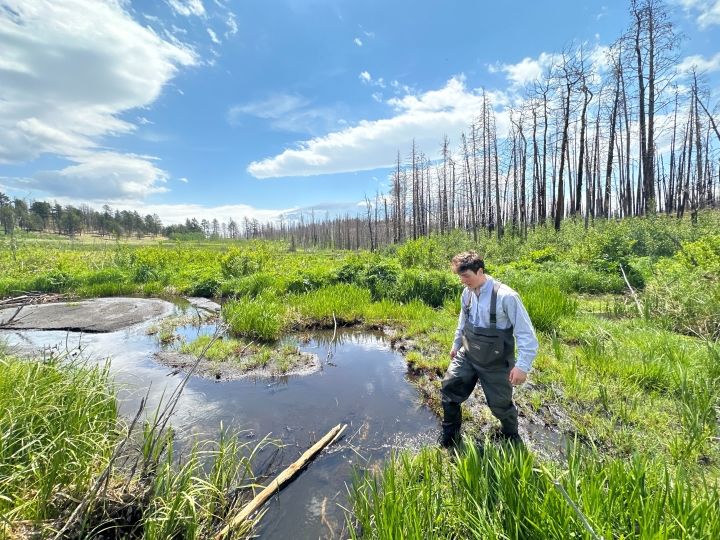A senior thesis published in Hydrological Processes explores how the increase in extreme precipitation events is causing more flooding—but only in certain areas, and not at the usual times.
The research by Owen Richardson ’24 could help focus flood mitigation efforts where they’re needed the most.
The article, Spatial Variation of Changes in Extreme Discharge Seasonality Across the Northeastern United States (PDF), also involved professors working both inside and outside the classroom to mentor a motivated undergraduate.
“It is what we do best at Dartmouth,” said Professor of Geography Frank Magilligan, who worked with Richardson on his research along with Professor of Earth Sciences Carl Renshaw, his main adviser. Renshaw and Magilligan are co-authors of the study.
While this isn’t the first senior thesis Magilligan has seen turn into a published work, it’s perhaps the one that’s landed in the most prestigious journal.
“He’s incredibly smart and very self-effacing,” Magilligan said of Richardson, adding that he aced high-level classes that give graduate students pause.
Richardson came to Dartmouth from his home state of Colorado. He liked Hanover’s easy access to hiking and backcountry skiing—Richardson is big into the outdoors—as well as Dartmouth’s approach to liberal arts education.
In high school, he was drawn more to the humanities than science, but you can’t come from Colorado and not be interested in resource management issues. That, and a flood that affected his community led him to an earth sciences course during his first year at Dartmouth.
He really liked it, so he signed up for Renshaw’s Big Data Science in Hydrology course, where he began learning to apply statistics to the natural world. “And that was the start of it all,” Richardson said.
He dove into a final project for the class, the seed of which would grow into his senior thesis and journal article. He began working with professors Renshaw and Magilligan outside of the classroom. And he found himself drawn to tackling big questions using existing data sets.
“The questions, especially when it comes to hydrology—not only are they scientific questions where people gain insight, but it also impacts society and everyone living in it,” Richardson said.
One of those questions had to do with flooding. A previous Dartmouth study found that extreme precipitation events in the Northeast had increased sharply in 1996, and while there was an anecdotal connection to floods, the data wasn’t always clear.
Historically in the Northeast, floods come in spring as the snow melts. But with a warmer climate, there’s less snow to melt. More recent floods—especially the big, destructive ones that make the news in Vermont and New Hampshire—seem to happen during summer or fall instead of spring.
For a long time, Richardson struggled to make sense of the data, which didn’t link the floods with the additional precipitation in the Northeast. The breakthroughs came when Richardson, with help from Magilligan and Renshaw, started breaking down the study area into smaller regions.
It makes sense, as not every place in the Northeast is the same, weather-wise. In Vermont and New Hampshire, warm air full of moisture dumps a lot of focused precipitation when it rises and cools going over mountains, contributing to floods in confined valleys.
“And so where you see the epicenter for this extreme flooding is really the Green Mountains and the White Mountains,” Renshaw said. “It’s not an entire Northeast effect.”
Understanding where to spend limited resources will be critical in the years to come, and Richardson’s findings could help point officials in the right direction.
“We have to really think about how do we do flood mitigation and climate adaptation in Vermont and the White Mountains right and successfully,” Renshaw said. “Because our old approaches aren’t going to work.”
Renshaw and Magilligan admire how Richardson doggedly pursued his research throughout his time at Dartmouth, even when clear results weren’t guaranteed. They also point out how well Richardson fit in with graduate students during their weekly lab group meeting, and how he showed initiative during a summer internship with NOAA on the island of Guam (always the outdoorsman, Richardson also learned to spearfish while he was there).
This fall, Richardson began pursuing a master’s degree in geoscience at Colorado State University. He doesn’t have any new papers in the works yet—coursework and the occasional backcountry ski trip keep him plenty busy.
Asked if he had any advice for Dartmouth students interested in pursuing a similar path, Richardson suggested sticking with a project, prioritizing research time in your schedule, and not being afraid to ask mentors for help.
“I’m really grateful that Carl and Frank were just so available,” he said. “It was never scary for me to ask them for help or guidance. … I never felt under pressure to deliver something, and that made it much easier to actually collaborate.”

